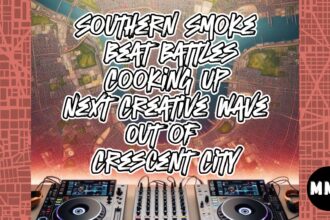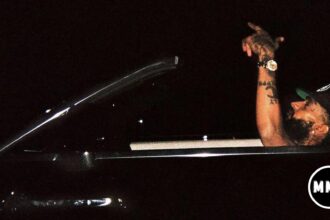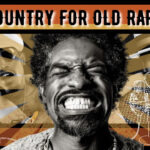To get the most out of this piece, I encourage you to listen to “Mockingbird” before you start reading!
The opening lyrics to Ruston Kelly’s “Mockingbird” are not sung until 1:02. In our instant gratification epoch, that’s a lifetime. For perspective, in Harry Styles’ “As It Was,” Spotify’s third most streamed song of 2023, we’re presented with the melodic hook in the first six seconds. In Spotify’s most streamed song this year, Miley Cyrus’ “Flowers,” we’ve completed a full intro-verse-pre-chorus-chorus cycle by 1:02. If these songs were people, “Flowers” would be in college when “Mockingbird” was entering fourth grade.
So, what exactly is Kelly doing for 62 long seconds?
Well, at 00:22 we get the ascending guitar line; the central motif of the piece. I think for 95% of artists this is where the song would start—and that would be fine!—but an old soul like Kelly seems to be in no rush. Instead, he elects to welcome us with a prelude to the exposition with that gorgeous picked guitar intro that we never hear again. Friends, what we have here is the acutely rare double intro! It’s like in a James Bond movie where you get the cold open leading into the musical credit sequence
Once we arrive at the ascending line—using sixth voicings right out of the country guitar handbook—the next 40 seconds are unassailable. As Kelly repeats the line four times and the band bubbles, brims, and bristles behind him, it plays like a plane lifting off. When the groove finally kicks in at 00:36 with that soaring harmonica overtop, it really does feel like you’re flying.
At 1:02, when many 2023 releases are already beginning their return flights, Ruston Kelly is just getting started. In a gritty tenor he croons,
Pretty wings, you’re the prettiest thing
You’re like Parker Posey in a magazine
With faded jeans and a crop top back in ’93
I wanna be your dressed in black
Your dark star with the backwards hat
I’m gonna write a book and put your name on every page
Every page
This is just elite stuff. Opening with the four ‘p’ words sings like syrup. “I wanna be your dressed in black, your dark star with the backwards hat.” So visual, so rich! What a killer way to say you’re really into someone. The great Gillian Welch once said, “If you want to convey a feeling, use descriptions rather than generalities. Instead of, ‘I love you,’ try something like, ‘If you were a beer, I’d drink a case.’’’ I think Kelly got the memo.
Having listened to this song hundreds of times over the years, only when moved to write about it did I wonder where Ruston Kelly came from. He was born in South Carolina, but grew up in Ohio. At 17, Kelly moved to Nashville to pursue music in earnest. “Mockingbird” is off of his 2018 debut, Dying Star (another standout from my discussion of great debut albums). Dying Star is Kelly’s original referendum on cleaning up and turning his life around.
Kelly got heavy into drugs in his Nashville early years, eventually escalating to an overdose in 2015. From Rolling Stone,
“After he came home from the hospital, Kelly found himself standing on his porch, wondering what it would finally take for him to kick his drug habit and get his life back on track. The words ‘dying star’ came to him and he got to work, both on making an album and finding a way to stay clean.”
In Ruston Kelly’s own words,
“I wanted to make a very human record. A raw transcription of a particular time in my life. From ugly to hopeful and intensely honest. I didn’t want it to be drenched in the suffering that inspired the songs, but rather feel free and releasing. Sonically, I think this was achieved through sparseness, which allowed for that intent to come through. Also, the most emotional instrument on this record, steel guitar, is played by my father, who lived these songs out with me in real life.”
Kelly imprinted his harrowing journey in “Mockingbird”’s sonic DNA, and this truth is critical to what gives the recording fervor.
I want to return to the part about Ruston moving to Nashville as a teenager. I am from Northampton, MA, an artsy stronghold burrowed in the rustic beauty of Western MA. Locals call it the “Happy Valley.” Things around here are a little slower, a little more quiet.
When I was growing up, I didn’t understand that being a middle-class musician was an option. I had no awareness you could make a living ghostwriting in Nashville, or concocting an economic mix of wedding gigs, private lessons, and session work to pay the bills. I basically thought you were either Beyoncé or you jammed in the garage after your day job.
Then I moved to Austin, TX and everything changed. I discovered there was an entire continuum for how a music career could be conceived and executed between the two extremes I had erected in my mind. More to the point, I met local musicians in their early twenties who were lightyears ahead of me. Kids fresh out of high school that were already gigging all over town, taking their shit seriously, and even touring—what felt like a distant fairytale to me!
From what I learned in Austin, I now believe it takes a solid decade to launch a music career. Anyone you think was an overnight success, go look into their history. I bet they were hustling for years. Google Ed Sheeran or Anderson .Paak, you’ll get a feel for what I mean.
I moved to Austin when I was 26. I signed a record deal when I was 29. Next year I’ll complete my grind decade and turn 36. I’ll also have a 3-year-old and a full-time job to support my little girl.
I am so profoundly grateful for my journey and my career. I hustle every single day and poured my heart into my music. But I started too late. Better put, I found out too late. I often wonder where I’d be today if I had Kelly’s clarity and gumption to go all-in at 17.

Good music flows like time, but let’s return to our One Song, “Mockingbird”. It’s time to address Kelly’s voice. What a fucking voice. It sounds like it is spawned from the earth, ash, and dust of the Deep South. Like he’s holding American history in his throat and revealing little fragments with each word.
Stripping the arrangement down to just the acoustic guitar at the top of the first chorus (1:33), then having the band cascade in on the chord hits, is a stroke of production mastery. I can’t say if this was Kelly’s idea or the influence of producer Jarrad K (who’s credits include Kate Nash and Weezer), but I raise my glass to both.
What is there really to say about a perfect chorus? Killer melody, evocative lyrics, great energy. It’s just right. A great chorus is like getting through security at the airport and finding your plane is already at the gate. You can just sit back, relax, and let the journey carry you.
Let’s take a brief right at Music Theory Boulevard. The verse of “Mockingbird” starts on the V chord (F) and the chorus starts on the IV (Eb). I believe this is central to what gives an otherwise harmonically simple song such life and character. Fairly sure Ruston Kelly didn’t think about this consciously while writing it, but credit to the beautiful text painting that a song about feeling unsettled, “upside down,” and “strung out” never starts a section on the I—or more colloquially known as the ‘home’—chord.
From chorus I on, the song unfolds in traditional pop fashion. We get an inspired verse II. I love these quick, but potent, metaphors; “I was the desert, honey, you were the sand / I was a bird, baby, you were the branch.”
After chorus II we get the customary riff/solo; a super catchy, singable line played on what sounds like 12-string guitar with the return of Kelly’s harmonica screeching above. I adore this arrangement technique of marrying a riff with a solo for July fireworks-level results. It reminds me of Wilco’s “Impossible Germany” or Zeppelin’s “Custor’s Pie.”
For chorus III, Kelly returns to the band cut maneuver from chorus I, but waits for the second pass through the progression for the band’s reveal. I’ve long believed these subtle, intentional variations are what elevate pop tunes from good to great. I see you Ruston Kelly—I see you!
And, at long last, in the time we could listen to both “Flowers” and “As It Was,” Kelly gently brings us in for a landing with that charming, emotionally ambiguous guitar line that has anchored our journey. Bravo.
Beyond being a great song to blare down the freeway, “Mockingbird” is an exemplary reference to be picked apart and analyzed by all the rising songwriters out there. This song checks all the Great Song boxes:
- Arresting lyrics ☑️
- Magnificent lead vocal performance ☑️
- Cool intro ☑️
- Riff that adds melodic interest and provides a counter melody ☑️
- Reliable, time-tested form ☑️
- Dynamic peaks and valleys ☑️
If you wanna write a great song, do those things.
But “Mockingbird” isn’t just a great song…it sounds like a song out of another time. From Ruston’s voice, which might as well be from the Civil War, to the use of harmonica, and the organic, soulful instrumental performances, “Mockingbird” is unbound from the digital elements, Auto-Tune, and dissecting production that defined 2023’s music landscape.
As someone who regularly needs to swap notifications, AirPods, and A.I. for trees, mountains, and rambling brooks, I find comfort in Ruston’s music. Time rolls ever forward, but music allows us to fly back, even if only for 4:37.









